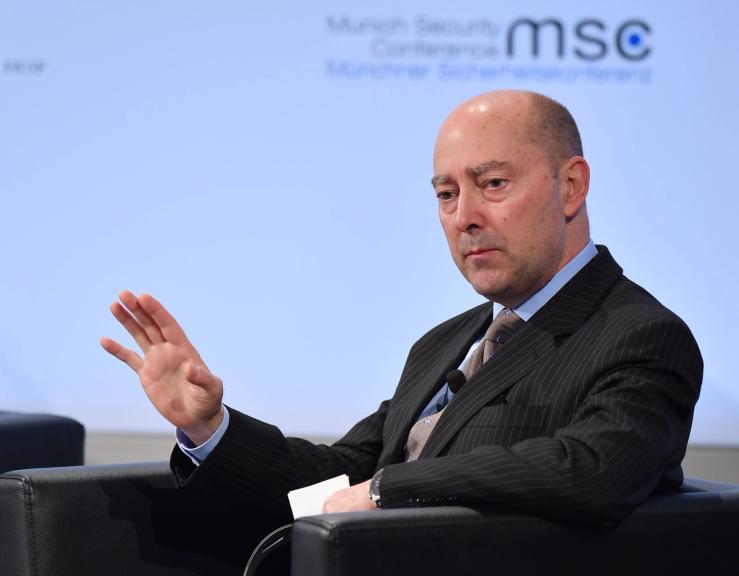Q&A
Admiral James Stavridis is the former supreme allied commander of NATO and a vice chair at Carlyle, the investment giant.
Liz Hoffman: Markets are taking all this in stride. Why?
Admiral James Stavridis: It’s all moving too fast for the markets to absorb. Everyone is kind of like a ping pong ball floating on top of a river that’s rushing at immense speed. It will settle down. Geopolitically, the Iranians are looking for an off-ramp, the US wants things to slow down here. The Israelis have some motivation to continue strikes, but even there, they have accomplished an awful lot of their goals — degraded the proxies, degraded the nuclear program. We’ll know more about that soon. But if you step back from the breathless moment-to-moment, things are trending toward a negotiating table.
If you’re an investor, obviously, keep observing closely. You’re watching for battle damage assessment on the nuclear strikes. You’re looking at Iranian signals. Are they really willing to come to the table? You’re looking at Israel standing down on offensive strikes. I think you’re going to see all three of those things in the next week or so. And therefore, I think markets have made that call and are staying relatively stable.
So what does all that mean for investing?
Number one, Israel emerges as a very powerful entity and an attractive place to invest, particularly in cyber security, defense, but generally in tech and AI. Number two, cyber security. As I look at the diminishment of kinetic missiles, bombs, rockets being thrown back and forth, the next battlefield could be cyber. The Iranians have real cyber capability. Certainly their general partners, Russia and China, have immense cyber capability. That looks like a pretty good bet to me, going forward.
Number three is energy. At least at the moment, the odds of the Iranians suddenly closing the Strait of Hormuz is diminished. That’s why oil prices are steady or falling. And that’s good news for the Gulf Arabs. Therefore, investments and investment partnerships with the kingdom, with Kuwait, with Qatar, with the UAE, look pretty good in this moment.
And then if we do get to a serious ceasefire, which I think is not impossible at this time, what is the big investment opportunity in the Middle East? It could be Iran. There’s a lot of chaotic movement, but the potential of this country that’s two and a half times the size of Texas, 90 million people, demographics vertical, highly educated, a culture that’s deep and strong, they believe in themselves as Persians. If you follow the geopolitical trends to a happy ending, which is not impossible, Iran becomes a very interesting investment opportunity. It could look like the reconstruction of the Korean peninsula after the end of the Korean War.
The Israeli stock market has been one of the best performers this year. What do you make of that? Is that global investors expressing a thesis, or more of a patriotic home rally?
The dynamism of Israeli society has been on full display for the last couple of years. Their specialization in tech, cyber, AI is attractive. And the Israelis are starting to edge into space. So it’s a pretty rich ecosystem.
Given their AI expertise, do you think Israel could join some of the joint ventures we’ve seen between big US tech companies and Gulf governments?
I do. A nice effect, if we can get to an Israel-Iran ceasefire, could be the end of hostilities in Gaza. That’s a very different geopolitical calculus, and in some ways a harder one, but let’s say we could get to a point in Gaza where there’s some reconstruction, largely funded by the Gulf Arabs — that would really unlock full cooperation between the Gulf and the Israelis. There’s been some level of that, but because of the lack of diplomatic recognition, it’s been hindered.
Wall Street has rushed into the Gulf over the past few years, opening offices and signing investment agreements. Does that now look risky from a physical safety standpoint with missiles flying into Qatar?
You’ve got to be mindful of it. And if we were literally having this conversation a week ago, your point would be quite germane. However, again, if we get to a substantive ceasefire, which I think has a two-in-three chance at this point, then I think you continue to feel comfortable having well-protected, alert, informed, connected employees in the region. I don’t see the expat population vanishing.
Notable
- JPMorgan studied three dozen global flashpoints, from the Nazi invasion of France to Russia’s invasion of Ukraine, and found no impact on global stock prices within a few months: “It’s as though the event never happened.”
- Research from the European Central Bank in 2023 found the same nonexistent relationship between wars and oil prices.
- Days after the Iran nuclear deal went into effect in 2016, an Iranian official predicted at Davos that lifting sanctions on the country could usher in 8% annual economic growth. “There’s no way they can succeed in doing what they want to do if they’re very busy funding a lot of terrorism,” then-Secretary of State John Kerry told reporters in Switzerland.


